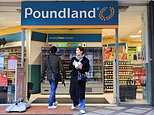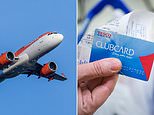Motorists will have to ‘look even harder’ as supermarkets
end battle of ‘cheap petrol’
By TOBY WALNE FOR THE MAIL ON SUNDAY
Want to save on a tank of petrol? Better fill up today as the latest battle in the price war between some of the biggest retailers draws to a close.
Until midnight tonight, supermarket Morrisons is offering a promotion of 6p off the price of a litre of fuel to shoppers who spent £40 at its tills before May 1.
Morrisons is not the only supermarket whose offer ends today.

Co-op is knocking 5p off a litre until midnight tonight for shoppers who gained vouchers from spending £30 in one of its stores.
Sainsbury's was offering 5p off a litre of petrol for anyone spending £50 at its stores with a promotion that ended on April 26.
The backdrop to these bargains, which are expected to be lossleaders for supermarkets as they try to get customers to spend on more profitable goods in their stores, are price rises of 15p a litre for unleaded petrol and 20p a litre for diesel since April 2010.
The price of a litre of unleaded petrol is now on average 135.8p while diesel is 142p, according to the AA's latest data. It found that supermarkets were the cheapest outlets, offering an average of 133.3p for a litre of unleaded.
Yorkshire and Humberside are the best areas to fill up in, with an average of 135.1p for a litre of unleaded across all outlets. Northern Ireland and the South-East scored the worst, charging 136.3p.
Brendan McLoughlin, managing director of comparison website petrolprices.com, believes that motorists must work even harder to find the cheapest pumps.
'The price of filling up a tank can vary by several pounds due to how often the station needs to put in new fuel and local competition,' he says. 'Supermarket promotions look good on paper but, as you also have to shop there, they may not offer the best value overall.
'When oil prices are volatile and rising, you may get a better price at a less popular petrol station.'
This is because supermarket pumps may fill up every day due to the high levels of custom they attract and must pay the market price at that time. A less busy petrol station filling up once a fortnight may have paid less.
However, in rural locations where there are fewer stations and less competition, motorists are likely to pay more.
The undisputed winner is the taxman. Duty went up 1p a litre on April 1 last year followed by a further 1p a litre rise on October 1.
A 0.76p rise in duty on January 1 this year was rapidly followed on January 4 by the 2.5 percentage point increase in VAT – which is payable on both the duty and fuel – bringing the duty up to 58.95p a litre.
On March 23, the Government announced an immediate 1p a litre cut in the duty for both petrol and diesel in the Budget to bring it down to 57.95p a litre.
At the same time it announced a 'fair fuel stabiliser' policy, a complex formula designed to ensure that petrol does not suddenly become unaffordable if oil prices soar unexpectedly.
When the price of oil rises above a target price fuel duty will increase by no more than the rate of inflation. But when it drops below a certain level, duty may increase to pay for any 'subsidy' for the higher prices.
The small print, such as the all-important price benchmark, have yet to be sorted out and the policy will not come into force until January 1 next year.
The way you drive has a huge impact on how much fuel is burnt and sensible motoring can cut bills by as much as half.
Professor Stephen Glaister, a director of the RAC Foundation, says: 'There are a number of fuel-saving measures to observe. Stick to the speed limit. Bombing down the motorway at 80mph can use 20 per cent more fuel than going at 70mph. Drive more smoothly and change gear earlier. Turn the engine off when stuck in a jam or waiting to pick someone up.'
Another way to cut your fuel bill by up to three per cent is ensuring that the vehicle has correct tyre pressure. Lower pressure increases the drag, burning more fuel. Air conditioning also gobbles fuel, although opening windows can substantially increase drag.
Most watched Money videos
- Volkswagen teases small and affordable ID.1 electric car
- TWISTED boss Charles Fawcett explains company's love for Land Rovers
- How to invest in credit for an 11% annual return
- One-of-a-kind Aston Martin offered for sale for the first time ever
- A look at the 'blisteringly fast' new Ferrari 12Cilindri Spider
- Octopus CEO: Regional electricity pricing can save the UK £51 billion
- Inside Britain's best-selling EV: The new Tesla Model Y
- Gen X falling behind on saving for retirement, research shows
- Kia launches its new eye-catching and stylish EV3 electric SUV
- The new two-door two-seater Aston Martin Vantage Roadste
- Bar manager and his husband feeling flush after winning OMAZE gem
- No taste buds no problem! Marks and Spencer launch wine AI tool
-
 Major bank set to pay customers £12.5m compensation after...
Major bank set to pay customers £12.5m compensation after...
-
 Volkswagen's affordable small EV: ID.1 will arrive in...
Volkswagen's affordable small EV: ID.1 will arrive in...
-
 Iconic UK chain with 825 stores put up for sale following...
Iconic UK chain with 825 stores put up for sale following...
-
 Are you putting your dog in danger in the car - and...
Are you putting your dog in danger in the car - and...
-
 Now Schroders urges Reeves to cut cash Isa limit - but...
Now Schroders urges Reeves to cut cash Isa limit - but...
-
 Three secrets to becoming an Isa millionaire revealed by...
Three secrets to becoming an Isa millionaire revealed by...
-
 Private parking firms make requests for car owner data...
Private parking firms make requests for car owner data...
-
 Poundland's owner Pepco considers selling struggling...
Poundland's owner Pepco considers selling struggling...
-
 How Tesco Clubcard users can bag 10,000 bonus points when...
How Tesco Clubcard users can bag 10,000 bonus points when...
-
 A third of drivers feel 'less safe' on smart motorways...
A third of drivers feel 'less safe' on smart motorways...
-
 ITV Studios scores record profits despite strikes hitting...
ITV Studios scores record profits despite strikes hitting...
-
 Reckitt hikes dividend for investors amid efficiency drive
Reckitt hikes dividend for investors amid efficiency drive
-
 MARKET WATCH: Melrose leads Footsie sell-off as US tech...
MARKET WATCH: Melrose leads Footsie sell-off as US tech...
-
 Admiral to hand share bonuses worth up to £3,600 to...
Admiral to hand share bonuses worth up to £3,600 to...
-
 Yet MORE rate cuts can't calm 'risky' eurozone, warns ECB...
Yet MORE rate cuts can't calm 'risky' eurozone, warns ECB...
-
 ITV proves the critics wrong: Shares may be up, but...
ITV proves the critics wrong: Shares may be up, but...
-
 Entain profits jump as digital gaming grows - but...
Entain profits jump as digital gaming grows - but...
-
 We're travel experts - here's your ultimate guide to...
We're travel experts - here's your ultimate guide to...















































































